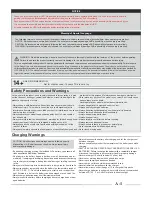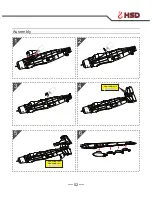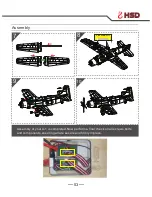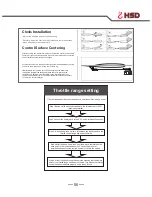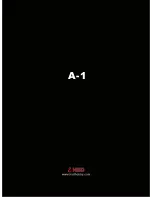
09
Problem
Cause
Solution
Motor does
not turn
1
.
Battery is not fully charged
2
.
Transmitter battery low
3
.
Motors not connected
4
.
The motor is damaged
5
.
Reciever is not bound to Tx
6
.
ESC in set-up mode
Control Surfaces
are not responding
to stick input
Model is flying
erratically
1.The control surfaces are not centered
2.The control surfaces are severely off
center
3.Center of Gravity (CG) is not in the
correct position.
Model does not
climb well
1.The battery is not fully charged
2.Elevator surface response is
reversed
3.CG is too far back causing a tail
heavy airframe
Limited Radio
Range
1
.
Transmitter or receiver
(if applicable) power is low
1. Charge or replace any batteries used
on the transmitter and receiver (if
applicable)
Model moves
backwards
1
.
Locate the three (3) connections between
the motor and ESC, disconnect two (2) of
the three (3) and swap their places for
proper response
2
.
Install a full charged battery
3
.
Check for connection
ESC and
between the
4
.
Replace motor
5
.
Consult Radio manual and
through bind procedure again
go
6
.
Hold
model
and
move
postion then back down to idle
throttle to full
1
.
Both ESC and motor are not
establishing a proper response
range
1.The servo lead may be connected
to the receiver incorrectly
2
.
The servo is damaged
1.Make sure the servo leads are properly
connected to the receiver
2.Replace the servo
1.Make trim adjustments as necessary
on the transmitter if the issue is not serious
2.Make manual adjustments as necessary
to the surface control linkages
3.Re-position the Li-Po battery as necessary
to achieve a balanced CG.
1.Re-charge the battery within the
specified charge time
2.Charge the surface direction via the
'reverse' function on the transmitter
3.Re-position the Li-Po battery as
necessary to achieve a balanced CG
1. Charge the batteries
Содержание A1
Страница 1: ...A 1 ...
Страница 5: ...02 Assembly 1 2 3 4 5 6 PM 3 35MM 2pcs PM 3 60MM 1pcs PM 3 45MM 1pcs ...
Страница 10: ...07 CG LOCATION 15mm 15mm 15mm 15mm 20mm 20mm Flaps 35mm CG 80 85mm ...
Страница 14: ...A 1 ...


